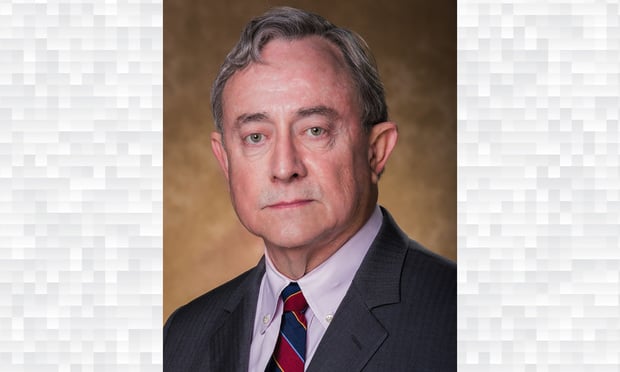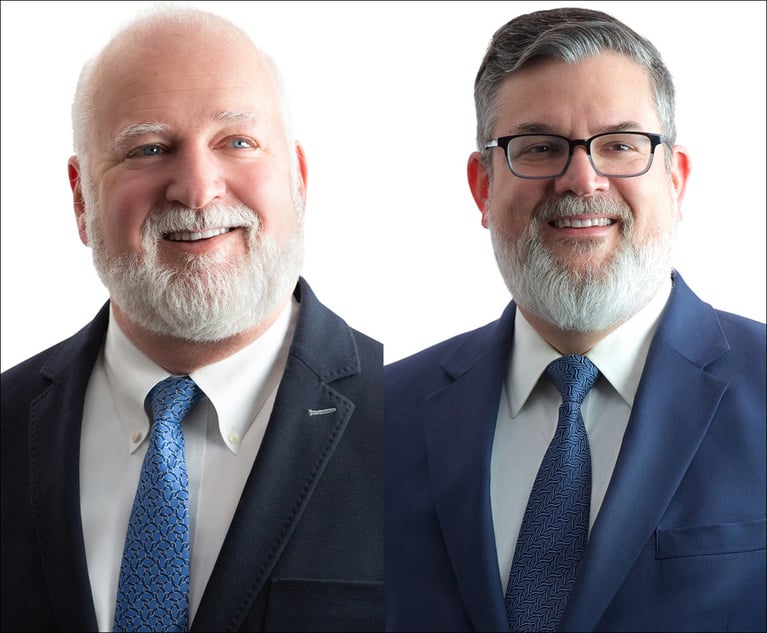Top Bar Examiner Shares Insights as He Takes National Role
Tom Cauthorn, the chair of the Georgia Board of Bar Examiners, explains how the six examiners write and oversee the grading for the essay half of the state bar exam.
October 18, 2017 at 04:07 PM
7 minute read
 Tom Cauthorn
Tom CauthornHandout photo
As the 1,350 examinees who took the Georgia bar exam in July wait anxiously for results to be released on Oct. 27, the state's head bar examiner, Tom “T.E.” Cauthorn, is already preparing for the February exam.
Cauthorn has served as a judge, a state legislator—and for the last six years, as one of the state bar examiners who write and grade the essay questions about Georgia law for the bar exam. Now he is helping to shape the essay questions nationally.
While Georgia exam-takers must answer four essay questions about state law, there are 33 states that instead use national essay questions, the Multistate Essay Examination (MEE) from the National Conference of Bar Examiners. Cauthorn, who is the founding partner of Cauthorn Nohr & Owen in Marietta, has been asked by the National Conference of Bar Examiners to review essay questions for the national portion of the exam. He's started a one-year term on its Multistate Essay Examination / Multistate Performance Test Committee—the only Georgian in the roughly 25-member group.
Cauthorn is the chair of Georgia's six-member board of bar examiners, which serves the Office of Bar Admissions, until Jan. 1, when his six-year term expires and Lamar Sizemore of Clark & Smith in Macon will succeed him as chair. In addition to grading the essay questions on Georgia law, the examiners grade the Multistate Performance Test (MPT)—an additional two essay questions designed, according to the National Conference of Bar Examiners, to test an examinee's ability “to complete a task that a beginning lawyer should be able to accomplish.”
In Georgia, as nationally, exam pass rates have declined over the past few years. The trend continued last year but at a lesser rate, with 65.8 percent of all test-takers and 72.4 percent of first-timers passing the July 2016 bar exam. When Cauthorn joined the Board of Bar Examiners in 2012, the pass rate for the July exam was 79.7 percent overall and 85.3 percent for first-timers.
Last year, the board of bar examiners announced that a scoring error meant 90 test-takers who took the July 2015 and Feb. 2016 exams for Georgia had been mistakenly told they failed. The error was in the formula used to scale the scores for a small portion of essays, and the board engaged a psychometrician to oversee the scaling of future exams. Half of the 400 points on the Georgia exam come from the essay portion and the other half come from the 200-question multiple-choice section, the Multistate Bar Examination (MBE). It takes 270 raw points to pass the exam.
Cauthorn talked to the Daily Report about his work as a bar examiner and how the essay half of the Georgia exam works.
How did you get appointed to the national bar exam committee?
In Georgia we use the MPT1 and MPT2, which is why I'm on the committee. Its purpose is to review draft MPT and MEE questions and make suggestions as to narrowing or broadening the scope, changing the thrust of subquestions and commenting on whether or not they are constructive. The finished product goes into the February exam.
How does grading the essay portion of the state bar exam work? Do the bar examiners write and grade all the Georgia essay questions?
Every year, we write eight Georgia bar exam essay questions—four for each exam administration in February and July. We select topics from a list, and we look at what we've tested on recently and try not to duplicate it.
We meet around the state and get input from law school deans. We've been very active this year, trying to be more transparent [about the process]. We've made presentations to the [State Bar of Georgia] Board of Governors and the law schools. I suspect that will continue during Judge Sizemore's term as chair.
The newest examiner and the chair grade the MPT product [two 90-minute essay questions per exam]. The second- through fifth-year members each write and then grade two questions per year, one per exam. The examiners grade the questions they wrote, but we do not grade 2,000 essay questions apiece. [There were more than 600 exams in February and 1,350 in July.] We have graders who work with us, for a 29-person team. We calibrate our grading philosophies and compare the [raw] scores that we are giving to make sure we have a similar approach to the analysis of the answers.
Grading essays in and of itself is a subjective process. We have a matrix that keeps everybody within the same concept. If and your graders calibrate scores [for a question] and there are differences, you realize it and can adjust. [The raw scores assigned each essay are then scaled so that scores are consistent from year to year.]
Have the questions gotten more difficult over the years?
To determine that, you'd have to look at how the scoring and scaling compare for the MBE and the essay questions in a past year and then compare that to the scoring and scaling for the two portions for a later year. The real question is whether the level of performance is the same on the essay compared to the multiple choice section in a given year.
I wrote and graded two questions a year. I did not score and scale them. That is a process that is a subspecialty of statistics. The Office of Bar Admissions uses a psychometrician to oversee the scaling.
We strive to ask accurate, complete questions that rely on established law. We try not to draft a question that deals with an aberration or a brand new concept. They are based on solid case and statutory law, or we would not be testing students on something they are likely to have studied.
How does the pass rate for the July 2017 exam compare to that for July 2016?
I don't think it would be appropriate to comment on that, since the results have not yet been released.
You have practiced law for more than 40 years, including terms as the chief judge of Cobb County State Court and as a Cobb County Superior Court judge, followed by serving in the state Legislature. How did you become a Georgia bar examiner in the first place?
Six years ago, Justice George Carley, who was the liaison between the Supreme Court and the Georgia Board of Bar Examiners, called me. At the midpoint of the year, the liaison justice begins to make a determination as to the new bar examiner to replace the outgoing chair. Justice Carley suggested I think about it and talk to John Moore of Moore Ingram Johnson & Steele in Marietta to see what was involved. He had been on the board for six years and was the outgoing chair at that time. I talked to John, whom I'd gone to law school with, and then I called Justice Carley back and accepted the appointment.
All of this work as a bar examiner sounds time-consuming. Do you get paid?
We receive an emolument. We do not bill by the hour.
Why did you decide to do it?
When Justice Carley called me, I had not done anything toward public service for the profession since my service in the Young Lawyers Division [of the State Bar of Georgia] early in my practice, 40 years ago. I had been busy as a lawyer and as an elected official. And so I wanted to contribute. Last but not least, I was enormously flattered that he would ask.
This content has been archived. It is available through our partners, LexisNexis® and Bloomberg Law.
To view this content, please continue to their sites.
Not a Lexis Subscriber?
Subscribe Now
Not a Bloomberg Law Subscriber?
Subscribe Now
NOT FOR REPRINT
© 2025 ALM Global, LLC, All Rights Reserved. Request academic re-use from www.copyright.com. All other uses, submit a request to [email protected]. For more information visit Asset & Logo Licensing.
You Might Like
View All

Sunbelt Law Firms Experienced More Moderate Growth Last Year, Alongside Some Job Cuts and Less Merger Interest
4 minute read
Fowler White Burnett Opens Jacksonville Office Focused on Transportation Practice
3 minute read
Georgia High Court Clarifies Time Limit for Lawyers' Breach-of-Contract Claims
6 minute readTrending Stories
- 1States Accuse Trump of Thwarting Court's Funding Restoration Order
- 2Microsoft Becomes Latest Tech Company to Face Claims of Stealing Marketing Commissions From Influencers
- 3Coral Gables Attorney Busted for Stalking Lawyer
- 4Trump's DOJ Delays Releasing Jan. 6 FBI Agents List Under Consent Order
- 5Securities Report Says That 2024 Settlements Passed a Total of $5.2B
Who Got The Work
J. Brugh Lower of Gibbons has entered an appearance for industrial equipment supplier Devco Corporation in a pending trademark infringement lawsuit. The suit, accusing the defendant of selling knock-off Graco products, was filed Dec. 18 in New Jersey District Court by Rivkin Radler on behalf of Graco Inc. and Graco Minnesota. The case, assigned to U.S. District Judge Zahid N. Quraishi, is 3:24-cv-11294, Graco Inc. et al v. Devco Corporation.
Who Got The Work
Rebecca Maller-Stein and Kent A. Yalowitz of Arnold & Porter Kaye Scholer have entered their appearances for Hanaco Venture Capital and its executives, Lior Prosor and David Frankel, in a pending securities lawsuit. The action, filed on Dec. 24 in New York Southern District Court by Zell, Aron & Co. on behalf of Goldeneye Advisors, accuses the defendants of negligently and fraudulently managing the plaintiff's $1 million investment. The case, assigned to U.S. District Judge Vernon S. Broderick, is 1:24-cv-09918, Goldeneye Advisors, LLC v. Hanaco Venture Capital, Ltd. et al.
Who Got The Work
Attorneys from A&O Shearman has stepped in as defense counsel for Toronto-Dominion Bank and other defendants in a pending securities class action. The suit, filed Dec. 11 in New York Southern District Court by Bleichmar Fonti & Auld, accuses the defendants of concealing the bank's 'pervasive' deficiencies in regards to its compliance with the Bank Secrecy Act and the quality of its anti-money laundering controls. The case, assigned to U.S. District Judge Arun Subramanian, is 1:24-cv-09445, Gonzalez v. The Toronto-Dominion Bank et al.
Who Got The Work
Crown Castle International, a Pennsylvania company providing shared communications infrastructure, has turned to Luke D. Wolf of Gordon Rees Scully Mansukhani to fend off a pending breach-of-contract lawsuit. The court action, filed Nov. 25 in Michigan Eastern District Court by Hooper Hathaway PC on behalf of The Town Residences LLC, accuses Crown Castle of failing to transfer approximately $30,000 in utility payments from T-Mobile in breach of a roof-top lease and assignment agreement. The case, assigned to U.S. District Judge Susan K. Declercq, is 2:24-cv-13131, The Town Residences LLC v. T-Mobile US, Inc. et al.
Who Got The Work
Wilfred P. Coronato and Daniel M. Schwartz of McCarter & English have stepped in as defense counsel to Electrolux Home Products Inc. in a pending product liability lawsuit. The court action, filed Nov. 26 in New York Eastern District Court by Poulos Lopiccolo PC and Nagel Rice LLP on behalf of David Stern, alleges that the defendant's refrigerators’ drawers and shelving repeatedly break and fall apart within months after purchase. The case, assigned to U.S. District Judge Joan M. Azrack, is 2:24-cv-08204, Stern v. Electrolux Home Products, Inc.
Featured Firms
Law Offices of Gary Martin Hays & Associates, P.C.
(470) 294-1674
Law Offices of Mark E. Salomone
(857) 444-6468
Smith & Hassler
(713) 739-1250






